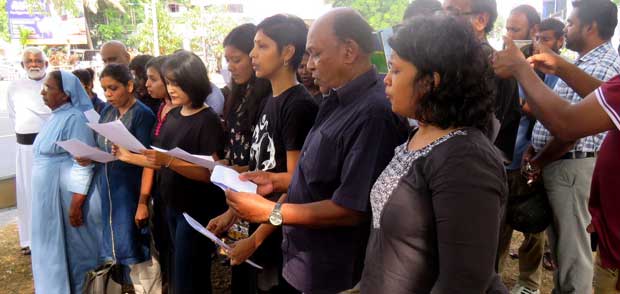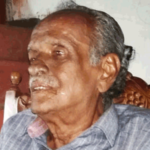Singing the National Anthem
Where is the Tamil Identity?
A dialogue on the new policy to sing the National Anthem in Sinhala only
On February 4th is Sri Lanka’s Independence Day. Parallel to the official ceremony in which only the Sinhala language version of the national anthem was sung, a diverse group of activists belonging to many ethnic and religious communities, sang the national anthem in both Sinhala and Tamil languages.
The newly appointed government of Sri Lanka decided to sing the national anthem only in Sinhala language at the 72nd Independence Day commemoration. In 2016, the Good Governance committee ruled to sing the national anthem in both Sinhala and Tamil languages because both are national languages.
“We met over a few days and rehearsed singing the national anthem in Tamil. Although we had heard the Tamil version of the national anthem, the words were not familiar to us. The pronunciation was difficult for us. We rehearsed extensively because pronunciation was very important,” said Marisa de Silva, a human rights activist who was one of the leads of this initiative.
The only politician among the activists who rallied to the cemetery roundabout of Borella, in the capital city of Sri Lanka, was Sirithunga Jayasuriya, the leader of the United Socialist Party. He pointed out that no MP or Minister had protested the decision to sing the national anthem only in Sinhala language.
“Independence Day is very important both to the country and its people. Therefore, our constitution paves way for the national anthem to be sung in both Sinhala and Tamil languages. The authorities ignored that fact and decided to sing it only in Sinhala language. I am against that decision and contributed to this activity to represent the rights of the Tamil speaking people on this Independence Day,” Jayasuriya said.
The people around the country are either elated or frustrated with the decision to sing the national anthem only in Sinhala language. Although Tamil people do not openly speak about the loss of rights, their opinions indicate that they are desperate and sorry. When they are given an opportunity they dare to speak out their sorrowful conscience.
They point out that freedom of expressing their identity is a right.
“Describing the mother, god or motherland in one’s language is a sensitive affair. It is very difficult to express gratitude to our motherland in a foreign language. If we try to do so, it is merely articulating empty words without feeling,” Yogarajan, 65, said. He is a Tamil Hindu writer from Jaffna. “It is a democratic and human right. No one can deny our right to sing the national language in Tamil language,” he added.
Regina and Anthonypullai are retired teachers who from Kankesanthrai. As Tamil Christians, they pointed out that the right to work on one’s mother tongue is a right by birth. “We cannot understand Sinhala language. In such a context, how can we join to sing the national anthem without feeling it? We must have the right to feel what we do and decline disowning that right from us,” they argued.
Yogaraja, Rejina and Anthonypullai highlighted that Tamil people would feel more as Sri Lankans through the freedom of singing the national anthem of Sri Lanka in their mother tongue and listening to it. They pointed out that it would improve the bond between the ethnicities.
The previous government understood the needs of the Tamil people and issued a circular declaring both Sinhala and Tamil state languages and allowed the national anthem to be sung in Tamil. With the regime change in 2019, this moderate policy changed and a Sinhala only national anthem policy was reinstated.
Swasthika Arulingam, a young Tamil human rights activist who participated in the activity of singing the national anthem in Tamil language expressed the following views: “Singing the national anthem in Tamil is not the solution for all the problems of the Tamil people in this country. However, when the government which must represent all the people say that the national anthem must be sung only in Sinhala language, it makes the Tamil people hopeless. That is why we took this action to express solidarity with all the Tamil people.”
Amali Welagedara is a civil society activist who joined the team to sing the national anthem in Tamil. She said, “This is a symbolic event because it is mass mobilization on behalf of the rights of the Tamil people. We gather at the cemetery junction in Borella to sing the national anthem in Tamil language to protest the state policy of Sinhala only at the Independence Day celebrations.”
Civil society activist of Colombo Nadeera Priyadarshani also said that she had come there to support the struggle for the language rights of the Tamil people.
“I participated in that programme very happily. There was an opinion that the national anthem could not be sung in Tamil language. We defeated that ideology and sang the national anthem in both Sinhala and Tamil language at this place,” said well-known human rights activist and Catholic priest Fr. Sarath Iddamalgoda.
“We must learn to respect the identity of the other ethnic communities if we want national unity and if we work for that. Ethnic unity is one of the major characteristics of a developed society. We will have no future without ethnic unity. We are not ready to die leaving behind this division of the society, We are active to build national unity,”Fr. Iddamalgoda further said.
Everyone who participated expressed the view that the government needed to further consider the decision to sing the national anthem only in Sinhala at official events. The government has further decided to sing the national anthem in Tamil language only in areas where Tamil people live.
Marisa de Silva said happily that her team was satisfied about the example of the people of all communities that joined hands in solidarity to sing the national anthem in Tamil as Sri Lanka Thaye.










